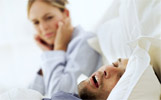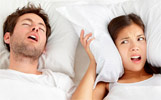
Information about snoring and sleep apnoea
Sleep apnoea
 Snoring is a sound made by vibrations of the soft palate and other tissue in the mouth, nose and throat (upper airway). Snoring is caused by turbulence inside the airway during breathing. The turbulence is caused by a partial blockage that may be located anywhere from the tip of the nose to the vocal cords.
Snoring is a sound made by vibrations of the soft palate and other tissue in the mouth, nose and throat (upper airway). Snoring is caused by turbulence inside the airway during breathing. The turbulence is caused by a partial blockage that may be located anywhere from the tip of the nose to the vocal cords.
Snoring in adults
Some 45 percent of normal adults snore at least occasionally, and 25 percent are habitual snorers
- Problem snoring is more frequent in males and overweight persons and it usually grows worse with age
- Snoring sounds are caused by an obstruction to the free flow of air through the passages at the back of the mouth and nose
- Only recently have the adverse medical effects of snoring and its association with Obstructive Sleep Apnoea (OSA) and Upper Airway Resistance Syndrome (UARS) been recognised
- Various methods are used to alleviate snoring and/or OSA and include:
- Behavior modification
- Sleep positioning
- Continuous Positive Airway Pressure (CPAP)
- Jaw adjustment techniques
- Uvulopalatopharyngoplasty (UPPP)
- Laser Assisted Uvula Palatoplasty (LAUP)
What can I do to stop snoring?
- Where appropriate UPPP surgery may unblock the airway and remedy snoring
Snoring remedies – what is UPPP surgery?
- UPPP surgery allows the treatment of snoring and mild OSA by removing the airway blockage
- The tonsils, uvula and a specified portion of the palate may be removed in a series of small procedures
- The uvula is shortened, eliminating the obstruction that has contributed to the snoring
Surgery to stop snoring – when is it needed?
- Surgery may be appropriate if your snoring is habitual and disruptive to others
- Your ENT specialist will evaluate you and ask the following questions:
- Do you snore loudly and disturb your family and friends?
- Do you have daytime sleepiness?
- Do you wake up frequently in the middle of the night?
- Do you have frequent episodes of obstructed breathing during sleep?
- Do you have morning headaches or tiredness?
- Suitability for UPPP is determined after a review your health history, lifestyle factors (alcohol and tobacco intake as well as exercise), cardiovascular condition, and current medications in use
- You will also receive a physical and otolaryngological (ear, nose, and throat) examination to evaluate the cause of the snoring
- Before the procedure is conducted, you may need to participate in a “sleep study,” which will grade the level of actual snoring and sleep apnoea
- This will complete the evaluation necessary for prescribing the appropriate treatment for your needs
After UPPP surgery
- If you undergo the UPPP procedure you can expect to return to a normal routine almost immediately
- For the majority of those undergoing this procedure there will be swallowing pain similar to a severe sore throat
- This discomfort lasts for approximately ten days and can be relieved by oral pain medicines
- Improvement is noted by the reduction in or disappearance of your snoring
If you have any questions about snoring please contact your local doctor who will arrange for your to see your ear nose and throat specialist.




